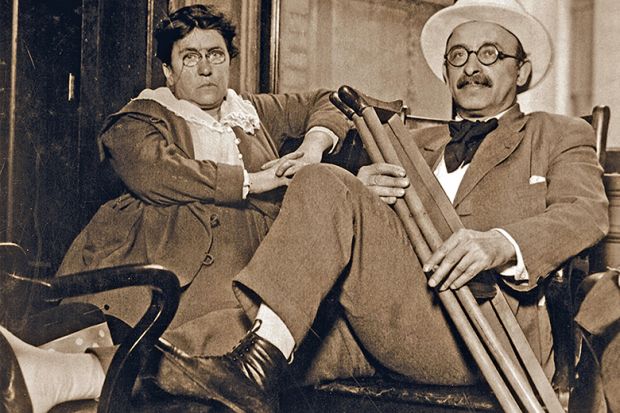In Considering Emma Goldman, Clare Hemmings forcibly demonstrates the relevance of the larger-than-life anarchist activist and writer (1869-1940) to contemporary politics. She excavates and activates Goldman’s resistance archive, analysing not only what Goldman herself wrote but also what subsequent feminist and queer scholarship has said about her. She then adds a further speculative layer, including a chapter where she reconstructs a correspondence between Goldman and her comrade and (likely) lover, Almeda Sperry. While Sperry’s letters have survived, Goldman’s have not.
In Hemmings’ creative construal, there is neither an ironing out of the wrinkles nor a playing down of Goldman’s often contradictory engagement with gender, race and sexuality. The book thus resists a certain tendency in feminist and queer historiography to straighten the messy and inconclusive aspects of Goldman’s thinking. It is precisely those unresolved tensions that constitute political struggle and ignite desire, all of which, for Hemmings, are central aspects of Goldman’s legacy.
Particularly provocative is how Hemmings reads Goldman’s hostility to both femininity and feminism as essential to her conception of the revolutionary potential of “qualitative sexual freedom”. Eschewing notions of equality – the mainstay of first-wave liberal feminism which, in the anarchist’s view, requires recognition from the state and so reinforces the status quo – Goldman posits that the sexual division of labour produces women’s exploited and alienated labour, and that this sexual division is the fulcrum on which the maintenance of the private sphere, the gendered nature of capitalism and patriotic militarism rest.
Furthermore, Goldman’s insistence on qualitative sexual freedom rather than equality allows her to foreground intersubjective relations as the bedrock of and for revolution. Precisely as neoliberalism fosters intensified individualism, affirming the relational aspect of our lives and thinking anew about how individuals can act in concert to challenge interlocking systems of oppression seem particularly urgent.
No less provocative is Hemmings’ discussion of Goldman’s musings on race and racism. Neither excoriating nor excusing Goldman for failing to address the particular histories and realities of racism or colonialism in ways that contemporary scholars might desire, Hemmings, instead, traces how her writing can potentially engender new ways of thinking beyond identity and identity politics. Goldman’s vision of internationalism and global kinship refuses biological constructions of familial as well as ethnic forms of identification, cutting across racial and national divides. This vision, in turn, encourages us, today, to imagine ourselves and the notion of political community differently.
Finally, Goldman’s own refusal to identify as a feminist raises a number of critical concerns for feminist theory and politics today. Here, too, a politics of ambivalence – one that understands ambivalence, as Hemmings does, as a generative site of tension, inextricably connected to political negotiation and struggle – might help us to think about our own passionate attachments to feminism. Is it possible to avow a political commitment to feminism, while simultaneously remaining vigilant about keeping its boundaries open to future contestation? This would mean that we remain open to new issues and identifications that challenge our conceptions of feminism and that feminism’s meaning remains a site of contestation. Can we, then, include Goldman in our queer feminist archival history without disregarding Goldman’s adamant refusal to identify as a feminist? With nuance, theoretical rigour and panache, Hemmings demonstrates that we can.
Catherine Rottenberg is a 2016-18 Marie Skłodowska Curie fellow in the sociology department at Goldsmiths, University of London and a senior lecturer at Ben-Gurion University of the Negev, Israel. Her book The Rise of Neoliberal Feminism will be published later this year.
Considering Emma Goldman: Feminist Political Ambivalence and the Imaginative Archive
By Clare Hemmings
Duke University Press
304pp, £77.00 and £19.99
ISBN 9780822369981 and 9780822370031
Published 5 January 2018




